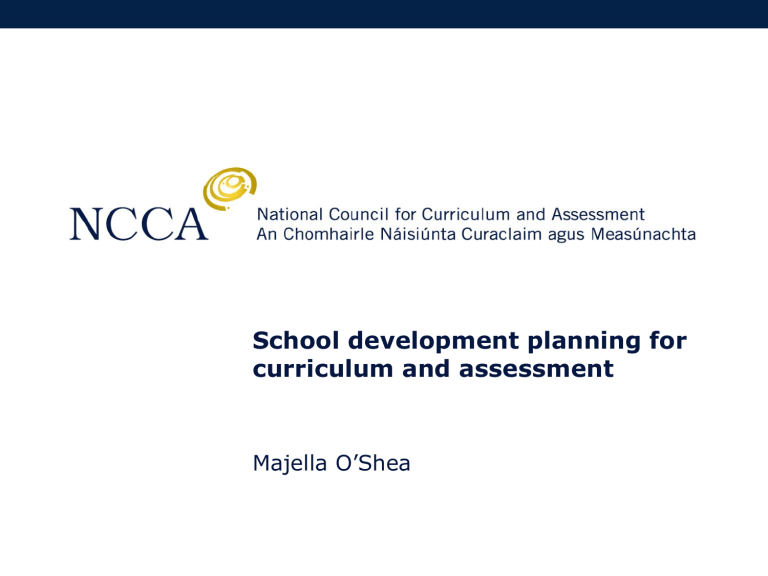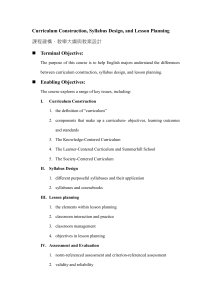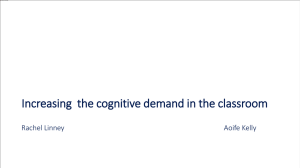School Development Planning for Curriculum and Assessment

School development planning for curriculum and assessment
Majella O’Shea
School development planning and the curriculum
All students to experience………..
…….quality education
…….appropriate to their needs
…….changing world
…….enhancing student learning
(SDP Curriculum planning)
…….
Education system of highest quality for learners …….
…….Innovative and creative environment for all learners
(NCCA, Strategic plan 2006–2008)
The press for reform…
The student experience
– Failure
– Non-participation
– Non-engagement
Evidence that the quality of teaching matters
Evidence that it matters more for students with special needs and with English as an additional language
Public accountability for public services
Knowledge society/ahead of the curve
Inclusion
– The discourse of the problematic
And the press against
The stretch factor in Irish education
The normative power of policy
Tradition and nostalgia
Complex educational structures, complex policy context
What learning is valued?
“Dumbing down”
Review
Research and theory
Curriculum
Representative committees development
Evaluations
Consultation
The developers
The public
Influencers
Resources
Professional development
Need for change – is there a crisis?
Time for planning
Classroom environment
Assessment
Skills/attitude of teacher
Pedagogy
Students
Agreed syllabuses/ curriculum
Curr. Planning schools
Teaching & learning
Exp. Of the students
Barriers to real learning in the classroom?
How can they be overcome?
The role of NCCA
The formal curriculum
– Advice, policy, syllabuses
Guidelines
– Subject guidelines
– Special needs
– Inclusion
– Intercultural
Further support
– Supporting teachers in planning for and creating the learning experience
Examples
Subject
Supporting teachers in planning for and creating a rich learning experience
Guidelines
Advice
Policy
Syllabuses
Curriculum and assessment Intercultural
Report card templates
Special needs
Tools
Sharing
ACTION website
Getting closer to schools
www.ncca.ie
What’s coming down the tracks?
Some guiding themes
Inclusion
Assessment for Learning
Key Skills
Pedagogy
Relationships
The classroom of diversities…
Greater ability range
Special needs
– general
– specific
English as an additional language
Differentiation
the most complex and technical aspect of the teaching craft
neglected in teacher preparation?
seen as static – getting the level/pitch right
Dynamic, demanding and sophisticated
Some differentiation challenges
The question of place
The question of pace
The question of range
The question of choice
The question of additional support
One of the biggest challenges… is to teach differentiation strategies……
To the students
Who may be used to learning in the middle
Who may be used to ‘hiding’
Who may be used to an easy pace
Who may ‘passenger’
Who may not have talked about learning
Who may want the answers, not the questions
Futures…
achievement gaps
concerns for teacher quality
collapse of public education
Disaffected student groups
OR…
International praise for achievement standards
Students with strong commitments to schooling
High quality teaching force
100 year-old wisdom….
What the wisest and best parent wants for his own child, that must the community want for all its children. Any other ideal for our schools is narrow and unlovely; acted upon, it destroys our democracy.
John Dewey. 1899, p.5.
Inclusion
SEN – guidelines and possible new award at Level 2 on
NFQ
Intercultural guidelines
Curriculum framework for students in detention centres
JCSP programme statement and review of profiling
NCCA Inclusion Project
Case Study Research
Schools dealing with the ‘inclusion challenge’
To move beyond anecdote
To capture what schools are doing
– Beyond normative policy to practice
– The ‘costs’….
To tender this autumn
Assessment for Learning
School-based work is complete
Dissemination of strategies
– With support services
– ACTION
Assessment in Primary Schools: Guidelines for
Teachers
info@ncca
Senior Cycle work
Senior Cycle
– phase one syllabuses
– short course on enterprise
– transition units
– flexible programmes of study
Key Skills
After 30 years of teaching, they pushed me to innovate and to really look at what it was like to learn in my class….
Phase one curriculum components
Subjects to be reviewed
Mathematics
Applied
Mathematics
Languages
New subjects Short courses
Social and
Political
Education
Physical
Education
Enterprise
Education
Other developments
Social, Personal and Health
Education
Technology –
Art and
Music
PE framework
Biology
Chemistry
Physics
Psychology
Feedback from the Key Skills Network
Classes are more enjoyable for everyone
Group work needs to be planned
Students like well-planned group work
Relationships in the classroom are better
Longer class periods are needed
Students are reluctant to change at first, but are glad when they do.
Junior cycle
Priorities
Syllabus rebalancing
Inclusion
Assessment for learning
Implications of ESRI research findings on curriculum, assessment, school organisation and planning
Implications of senior cycle developments
Current status of work
Ten syllabuses originally
Art, Craft, Design
English
Environmental and Social Studies
Geography
History
Home Economics
Music
Business Studies*
Gaeilge*
Mathematics*
* Now part of a broader review and revision process
Rebalancing – next steps
Final drafts of rebalanced syllabuses developed
Progressed through NCCA structures late 2007
Issued to the Department of Education and Science
Information material for schools on the adjustments
NCCA website to provide updates
ESRI research
900 students in 12 schools
Longitudinal study focused on students’ experience of junior cycle
First and second year reports published
Third year report and summary to be published in
October 2007
Informing policy and practice in junior cycle
First Year findings
Some students experience ongoing transition difficulties
Curriculum discontinuity a feature
Students respond well to varied teaching and learning approaches
Importance of positive teacher-student interaction and informal school atmosphere
Suitability of curriculum for a significant minority of students is questioned
Second Year findings
Characteristic ‘dip’ in academic performance and behaviour
Students become more negative about school generally
Negative effects of streaming intensifies
Gender and social class differences become more marked
Emergence of a ‘disengaged group’
Teaching and learning becomes more focused on Junior
Certificate
Third Year findings
(preliminary)
Students say they learn best when
– positive classroom interaction
– teacher explains well
– interactive, varied teaching methodologies
Focus on J Cert exams leads to more traditional form of teaching
Negative effect of streaming more pronounced
– disadvantaged schools in study group all streamed!
Strong influence of gender and social class on achievement
School expectation also significantly determines achievement
Significant number of students taking grinds
Streaming and JC grades
10=A; 9=B; 8=C; 7=D averaged across all subjects taken
5
4
3
8
7
6
2
1
0
Mixed ability Higher stream
Middle stream
Lower stream
‘School’ effect
Number of Higher Level Subjects Taken by School
(second lowest reading quintile)
9
8
7
6
5
4
3
2
1
0
Lang St Barrack
St
Dixon St Hay St Dawes
Point
Dawson
St
Park St Belmore Wattle St Fig Lane
St
Working-class Mixed Middleclass
Implications of senior cycle developments
stronger role for key skills in junior cycle curriculum
pressure to ‘scale back’ junior cert exams
need to harmonise junior and leaving cert courses
potential impact of a different school culture at senior cycle on junior cycle
increased demand for educational guidance
Developments in mathematics (1)
Increased emphasis on contexts and applications
Focus on higher-order mathematical skills
Proposal for phased development (both JC and LC)
– 5 syllabus ‘strands’ identified
– Initial involvement of approximately 24 schools
– All maths teachers in each participating school to adopt new syllabus materials for each strand/phase
– Class resource materials and teacher guidelines provided
– Professional support for teachers re changed emphasis and approaches in mathematics teaching and learning
– Developments supported by changes in relevant examination questions
Developments in mathematics (2)
Bridging framework to link primary and post-primary mathematics
Common mathematics course in first year
Need for collaboration between maths teachers
– consistency in approach used
– sharing of ideas and experiences
– school-based support as well as ‘inservice’ occasions
– issues around choice of course levels
– availability and use of ICT resources in maths
– allocation of teachers to classes/levels
Promotion of greater uptake of HL maths, especially in
Junior Certificate
Developments in mathematics (3)
Information on Project Maths to all schools – Nov 07
Invitation to schools to participate in initial implementation phase(s)
Participating schools identified early in 2008
Preparation meetings for participating schools in
Spring 2008
Syllabus and resource materials for initial phase(s) ready by May 2008
Implementation in participating schools from Sept.
2008
Roll-out to all schools beginning in Sept. 2009



